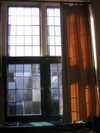 I keep smiling at things, all sorts of things, in a half-humorous, slightly bemused way – recognizing bits of Germanness that are so utterly, well, German: the way one notes the distinctly odd but predictable behavior of an old friend.
I keep smiling at things, all sorts of things, in a half-humorous, slightly bemused way – recognizing bits of Germanness that are so utterly, well, German: the way one notes the distinctly odd but predictable behavior of an old friend.
Gerhard has had me put up in a room in a reconditioned cloister, on a side street called the Nonnengasse – Nuns’ Alley. (I can’t help but imagine this, rather bizarrely, in a picture of rauchende Nonne – late at night, in the darkness of the alley, jaded-looking nuns in full habit and wimple, smoking, peering into car windows, and glaring at passers-by. What can I say, I spent lots of years in San Francisco, these things occur to me.)
Gerhard and Kunsu live, and are permanent artistic residents, at a ‘new space’ for performance, art, etc. in what used to be the Altstadt of Duisburg – everything in this part of town, as far as you can see, is reconditioned or newly built in one way or another; it’s kind of like the new government building in Newcastle, Pittsburgh, Baltimore, any old industrial town that has been refitted to fit a new service population –
but no, it’s not quite like any of those, because this is an extreme form of the German version of such a refitting: not very commercial, but very, very high-minded. Lots of new arts spaces, and all the architecture is stunningly imaginative and corporate at the same time. Which is what makes it so German that it is kind of funny: my room is tiny, severe, sort of monastic (what’s the feminine of monastic? – nunastic? –) but also utterly modern and intelligently engineered. The heating works perfectly, the windows open in two directions, the furniture is severe but well made. Very, very German – it’s been a long time since I’ve been in Germany for any length of time, and as Germany was the first major travel I did in my life away from California (initiating a decade of travel so frequent and extreme it actually wore me out), I have many feelings, many memories, related to Germanness, even everyday Germanness.
Even these light switches, here – the usual flat square that flips up and down, well made and extremely, well, definite. The small lamp that is both well-made and irretrievably dowdy – which sits on a hand-woven doily in two distinctly unattractive shades of brown, a flash of the tasteless crafts I associate with the ehemalige Ost (the former East Germany) and the Eastern European lands beyond; the kind of grandmotherly, hopelessly ugly but comforting, hand-made objects that filled the formerly Eastern Bloc apartment I occupied for six months in Alexanderplatz, in Berlin, in 1993, four years after the Wall came down. An apartment that was, by former Eastern standards, rather nice, rather chic – by ours almost unbelievably old-fashioned (that cumbersome, ancient washing machine).
But, here, that doily is a weird detail in the midst of the completely bürgerliche comfort of what used to be the heart of the industrial West, a land so heavily stamped with the ultimate in carefully, if rather tediously, planned living…
On the shelves above the bed are neatly, carefully bound, but in this case utterly boring, German books – they are, after all, the kind of books that get left behind in a public room, books that nobody could possibly want: old Krimis (mystery novels), collections of folk poetry, second volumes of multi-volume sets, university catalogues from five years ago, and an illustrated book of stories from Schiller’s early life, retold for the impressionable and the young. The nadir is an earnest tome titled 500 Jahre Kirche in Ruhrort (okay, for you in the back, who don’t get it: Five Hundred Years of Churches in – well, it’s a corner of Duisburg that used to be its own rather dull little village next to the Ruhr River, that has borne for centuries the ultra-unimaginative name of ‘Place On The Ruhr’). This is the modern German equivalent of those jokey Edwardian potshots taken at country British house libraries, especially by writers on weekend visits who have forgotten to bring a book to read: when they are faced with the Complete Sermons of lots of paleo-Georgian ecclesiastics stuffed in with tedious accounts of My Memoirs of Sixty Years of Hunting in Eastern Essex….
Funny, what associations this all brings back to me: the well-made, the dowdy, the severe, the comfortable. Quite different from my forays of the past five years into the chaotic but more stylish areas of Italy, of Spain, where life is so much more fun but, on the other hand, things don’t work anywhere nearly as well.
Comments